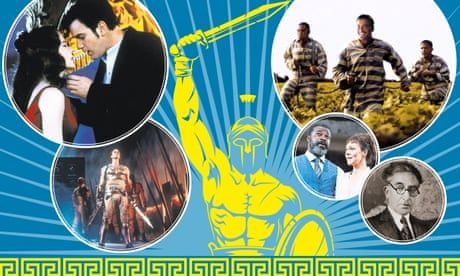
Love, death, grief, power, revenge: Greek tragedies get to the essence of the human experience. Here, writers and artists select their favourite plays, music and films inspired by the classics, from The Hunger Games to a Santana hit
Greek myth is not a stable thing. There is no such thing as a canonical, “original” version of a Greek myth. The stories that remain to us – the material of classical plays and poetry, and of visual culture from pottery to pediments – are already elaborations and accretions. In the ancient Greek and Roman world, stories were adapted and remade to serve the needs of the moment. The Greek tragedians often took the germ of an idea from the Homeric epics, and built an entire plot from it. Aeschylus’s Agamemnon, for instance, is in dialogue with Homer’s Odyssey: both are stories of a warrior’s return from war, but with entirely different outcomes. Euripides’s subversive play Helen proposes that the entire Trojan war was fought not in the cause of a real woman, but of an illusory, fake version sent by the gods, while the “real” Helen of Troy sat out the siege in Egypt.
Seen in this light, as novelist Pat Barker points out below, the modern appetite for working with (and maybe sometimes against) Greek myth is a part of a long continuum, rather than an innovation. Sometimes stories retold in the modern, or early modern, era have taken remarkably circuitous routes: Barker’s choice, Shakespeare’s Troilus and Cressida, a love story from the Trojan war, came to the playwright not directly from a classical source, but indirectly through a winding lineage including Chaucer and Boccaccio that substantially transforms the story in the process. The artist Chris Ofili, who illustrated my book Greek Myths: A New Retelling, is one of the most mesmerising “retellers” of classical mythology. His deep artistic engagement with this world of stories began for him with Ovid’s epic poem about mythical transformations, Metamorphoses, more than a decade ago. Emily Wilson’s translation of Homer’s Odyssey has also been important for him. But his paintings and drawings are, at the same time, deeply personal, infused with the landscapes and stories of the Caribbean, where he lives and works. Greek myths can travel endlessly through cultures, time and space. Kamila Shamsie’s novel Home Fire, set in modern Britain, Islamic State-controlled Syria and Pakistan, is a reworking of Sophocles’s tragedy, Antigone. Constantine Cavafy – the great Greek poet who lived in Alexandria, Liverpool and Constantinople – infused Homer with his restless spirit in his great poem Ithaka, which is chosen by Stephen Fry, below.
Continue reading...